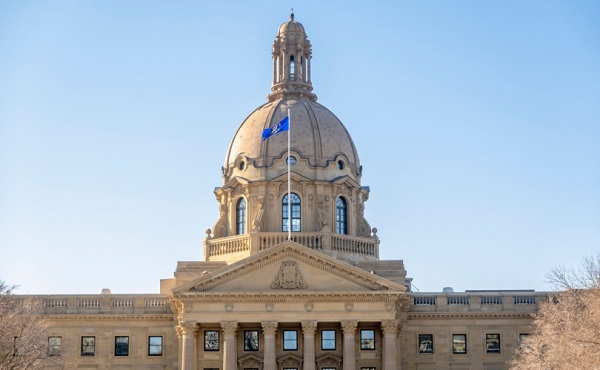Alberta
Alberta joins provincial opposition to federal Clean Fuel Regulations gas tax

Alberta joins provinces opposing federal regulations: Minister Schulz
Minister of Environment and Protected Areas Rebecca Schulz sent a letter to federal Minister of Environment and Climate Change Steven Guilbeault on the upcoming Clean Fuel Regulations:
“Today, I sent a letter to Minister Steven Guilbeault informing him that the Government of Alberta is joining the Government of Saskatchewan and the Atlantic provinces in calling on the federal government to immediately halt the implementation of the federal Clean Fuel Regulations on July 1.
“The federal Clean Fuel Regulations will harm provincial economies in Alberta, Saskatchewan and Atlantic Canada. Combined with the federal government’s carbon tax increase, higher gasoline and diesel costs are expected, putting added cost pressures on other goods and services across the country.
“Now is not the time to drive up prices at the pump and increase expenses for vulnerable households, businesses and industries. Families and businesses cannot continue to afford reckless cost and tax increases imposed by the federal government.
“Alberta has released an Emissions Reduction and Energy Development Plan which is our best path to enhancing our position as a global leader in emissions reductions, clean technology and innovation, and sustainable resource development. It includes a realistic aspiration to have a carbon-neutral economy by 2050, without compromising the affordable, reliable and secure energy that we all rely on.
“What we need now is a concrete plan that will help move us forward in realistic and innovative ways. The federal government needs to stop moving ahead with their costly plans until a path forward can be found that supports all Canadians.”
The letter
Dear Minister Guilbeault:
On behalf of the Government of Alberta, I am joining the Government of Saskatchewan and the Atlantic provinces in calling on the federal government to immediately halt the implementation of the upcoming Federal Clean Fuel Regulations.
Alberta is committed to reducing emissions while keeping energy reliable, secure, and affordable. Our Emissions Reduction and Energy Development Plan works towards a carbon neutral economy; commits to reviewing renewable fuel standards; increases minimum requirements for blending for ethanol and bio based diesel; includes fuel emission intensity reductions; and other major steps forward. We believe this is a path forward that will work for our unique circumstances.
The Federal Clean Fuel Regulations, however, will harm provincial economies in Alberta, Saskatchewan and Atlantic Canada. A plan that unfairly increases costs on families and does not account for regional differences is no plan at all.
The Office of the Parliamentary Budget Officer (PBO) confirmed this in a May 2023 report that found that the Clean Fuel Regulations would hit Alberta, Saskatchewan, and the Atlantic provinces the hardest. The PBO’s report estimated that the cost increase to the average Alberta households in 2030 would be $1,117.
Canadians are already struggling with high inflation. Adding fuel to the fire by hiking the cost of gasoline and diesel will be devastating.
This issue requires immediate attention. Given the pending implementation date of July 1, 2023, Alberta is requesting that the regulations be halted until a path forward can be found that supports all Canadians and addresses the concerns of Alberta, Saskatchewan, and the Atlantic provinces.
Sincerely,
Rebecca Schulz
Minister of Environment and Protected Areas
Alberta
B.C. would benefit from new pipeline but bad policy stands in the way

From the Fraser Institute
By Julio Mejía and Elmira Aliakbari
Bill C-69 (a.k.a. the “no pipelines act”) has added massive uncertainty to the project approval process, requiring proponents to meet vague criteria that go far beyond any sensible environmental concerns—for example, assessing any project’s impact on the “intersection of sex and gender with other identity factors.”
In case you haven’t heard, the Alberta government plans to submit a proposal to the federal government to build an oil pipeline from Alberta to British Columbia’s north coast.
But B.C. Premier Eby dismissed the idea, calling it a project imported from U.S. politics and pursued “at the expense of British Columbia and Canada’s economy.” He’s simply wrong. A new pipeline wouldn’t come at the expense of B.C. or Canada’s economy—it would strengthen both. In fact, particularly during the age of Trump, provinces should seek greater cooperation and avoid erecting policy barriers that discourage private investment and restrict trade and market access.
The United States remains the main destination for Canada’s leading exports, oil and natural gas. In 2024, nearly 96 per cent of oil exports and virtually all natural gas exports went to our southern neighbour. In light of President Trump’s tariffs on Canadian energy and other goods, it’s long past time to diversify our trade and find new export markets.
Given that most of Canada’s oil and gas is landlocked in the Prairies, pipelines to coastal terminals are the only realistic way to reach overseas markets. After the completion of the Trans Mountain Pipeline Expansion (TMX) project in May 2024, which transports crude oil from Alberta to B.C. and opened access to Asian markets, exports to non-U.S. destinations increased by almost 60 per cent. This new global reach strengthens Canada’s leverage in trade negotiations with Washington, as it enables Canada to sell its energy to markets beyond the U.S.
Yet trade is just one piece of the broader economic impact. In its first year of operation, the TMX expansion generated $13.6 billion in additional revenue for the economy, including $2.0 billion in extra tax revenues for the federal government. By 2043, TMX operations will contribute a projected $9.2 billion to Canada’s economic output, $3.7 billion in wages, and support the equivalent of more than 36,000 fulltime jobs. And B.C. stands to gain the most, with $4.3 billion added to its economic output, nearly $1 billion in wages, and close to 9,000 new jobs. With all due respect to Premier Eby, this is good news for B.C. workers and the provincial economy.
In contrast, cancelling pipelines has come at a real cost to B.C. and Canada’s economy. When the Trudeau government scrapped the already-approved Northern Gateway project, Canada lost an opportunity to increase the volume of oil transported from Alberta to B.C. and diversify its trading partners. Meanwhile, according to the Canadian Energy Centre, B.C. lost out on nearly 8,000 jobs a year (or 224,344 jobs in 29 years) and more than $11 billion in provincial revenues from 2019 to 2048 (inflation-adjusted).
Now, with the TMX set to reach full capacity by 2027/28, and Premier Eby opposing Alberta’s pipeline proposal, Canada may miss its chance to export more to global markets amid rising oil demand. And Canadians recognize this opportunity—a recent poll shows that a majority of Canadians (including 56 per cent of British Columbians) support a new oil pipeline from Alberta to B.C.
But, as others have asked, if the economic case is so strong, why has no private company stepped up to build or finance a new pipeline?
Two words—bad policy.
At the federal level, Bill C-48 effectively bans large oil tankers from loading or unloading at ports along B.C.’s northern coast, undermining the case for any new private-sector pipeline. Meanwhile, Bill C-69 (a.k.a. the “no pipelines act”) has added massive uncertainty to the project approval process, requiring proponents to meet vague criteria that go far beyond any sensible environmental concerns—for example, assessing any project’s impact on the “intersection of sex and gender with other identity factors.” And the federal cap on greenhouse gas (GHG) emissions exclusively for the oil and gas sector will inevitably force a reduction in oil and gas production, again making energy projects including pipelines less attractive to investors.
Clearly, policymakers in Canada should help diversify trade, boost economic growth and promote widespread prosperity in B.C., Alberta and beyond. To achieve this goal, they should put politics aside, focus of the benefits to their constituents, and craft regulations that more thoughtfully balance environmental concerns with the need for investment and economic growth.
Alberta
Alberta introduces bill allowing province to reject international agreements

From LifeSiteNews
Under the proposed law, international treaties or accords signed by the federal government would not apply in Alberta unless approved through its own legislation.
Alberta’s Conservative government introduced a new law to protect “constitutional rights” that would allow it to essentially ignore International Agreements, including those by the World Health Organization (WHO), signed by the federal Liberal government.
The new law, Bill 1, titled International Agreements Act and introduced Thursday, according to the government, “draws a clear line: international agreements that touch on provincial areas of jurisdiction must be debated and passed into law in Alberta.”
Should the law pass, which is all but certain as Alberta Premier Danielle Smith’s Conservatives hold a majority government, it would mean that any international treaties or accords signed by the federal government would not apply in Alberta unless approved through its own legislation.
“As we return to the legislature, our government is focused on delivering on the mandate Albertans gave us in 2023 to stand up for this province, protect our freedoms and chart our path forward,” Smith said.
“We will defend our constitutional rights, protect our province’s interests and make sure decisions that affect Albertans are made by Albertans. The federal government stands at a crossroads. Work with us, and we’ll get things done. Overstep, and Alberta will stand its ground.”
According to the Alberta government, while the feds have the “power to enter into international agreements on behalf of Canada,” it “does not” have the “legal authority to impose its terms on provinces.”
“The International Agreements Act reinforces that principle, ensuring Alberta is not bound by obligations negotiated in Ottawa that do not align with provincial priorities,” the province said.
The new Alberta law is not without precedent. In 2000, the province of Quebec passed a similar law, allowing it to ignore international agreements unless approved by local legislators.
The Smith government did not say which current federal agreements it would ignore, but in theory, it could apply to any agreement Canada has signed with the United Nations or the WHO.
-

 Uncategorized1 day ago
Uncategorized1 day agoTrump Admin Establishing Council To Make Buildings Beautiful Again
-

 Alberta1 day ago
Alberta1 day agoB.C. would benefit from new pipeline but bad policy stands in the way
-

 Economy21 hours ago
Economy21 hours agoTop Scientists Deliberately Misrepresented Sea Level Rise For Years
-

 Frontier Centre for Public Policy1 day ago
Frontier Centre for Public Policy1 day agoChurches Are All That Stands Between Canada And Tyranny
-

 Business1 day ago
Business1 day agoTrump Admin Establishing Council To Make Buildings Beautiful Again
-

 Energy10 hours ago
Energy10 hours agoCAPP calls on federal government to reset energy policy before it’s too late
-

 Alberta1 day ago
Alberta1 day agoAlberta introduces bill allowing province to reject international agreements
-

 Business1 day ago
Business1 day agoCarney government risks fiscal crisis of its own making










